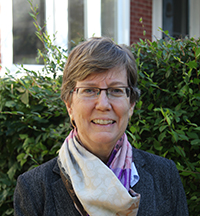Our fourth profile of IMS Fellows who were elected in May to the US National Academy of Sciences is devoted to Nancy Reid. Christian Genest from McGill University, Montréal, Canada, writes about her:
Nancy Reid became in May the first Canadian-based statistician to be elected to membership in the US National Academy of Sciences, Division of Applied Mathematical Sciences. A former President of the IMS (1996–97) and the Statistical Society of Canada (2004–05), Nancy is a leading figure on the North American statistical scene whose broad and influential contributions to research, coupled with an exceptional record of service to the profession, have earned her many distinctions and made her an inspiring role model for young researchers in science.
Born in St. Catharines, Ontario, Nancy studied mathematics and statistics at the University of Waterloo (B.Math., 1974), the University of British Columbia (MSc, 1976), and Stanford University (PhD, 1979). Her thesis supervisor was R.G. Miller, Jr. After postdoctoral studies with David Cox at Imperial College London (1979–80), she returned to the University of British Columbia as an Assistant Professor of Statistics (1980–85). Following academic visits to Harvard and Austin (Texas) in 1985–86, she joined the Department of Statistics at the University of Toronto, where she was promoted Full Professor in 1988 and University Professor in 2003. She chaired the department from 1997 to 2002 and has held a distinguished Canada Research Chair in Statistical Theory and Applications since 2007. She made extended visits to the EPFL (Lausanne, 2002–03) and University College London (2012) during her sabbatical leaves.
Over the past 40 years, Nancy has published four books, authored over 100 research papers and nearly two scores of professional articles, book reviews, interviews, etc. Her 1987 paper with David Cox on parameter orthogonality and approximate conditional inference is a classic still well worth reading today with its discussion in the Journal of the Royal Statistical Society, Series B (JRSS-B). Together with her husband Don Fraser, she developed asymptotic theory through the use of tangent exponential models. The fundamental insight shed by this work on the structure of models led, among other things, to their critical paper on “Default priors for Bayesian and frequentist inference” (JRSS-B 2010, joint with E. Marras and G. Yun-Yi). The bases for this work were laid out in a long series of papers that appeared, e.g., in Statistica Sinica (1993), Biometrika (1999), and The Annals of Statistics (2003).
Throughout her career, Nancy has also produced many authoritative survey articles. In this and so many other ways, she has been exemplary at sharing unselfishly her broad knowledge and expertise. Her Statistical Science article on saddlepoint approximations, published in 1988, has been very influential. The 2011 overview of composite likelihood methods that she wrote with Cristiano Varin and David Firth for Statistica Sinica has also been highly cited.
For her contributions to research, Nancy received the Presidents’ Award of the Committee of Presidents of Statistical Societies in 1992, and the Canadian Mathematical Society’s inaugural Krieger-Nelson Prize Lectureship in 1995. Noteworthy in her long list of honors and awards are her election as a Fellow of the Royal Society of Canada (2001) and as a Fellow of the American Association for the Advancement of Science (2002), the Gold Medal for Research of the Statistical Society of Canada (2009), the Fisher Memorial Lectureship (2016), and the Guy Medal in Silver of the Royal Statistical Society (2016). In 2014, she was appointed to the rank of Officer of the Order of Canada and in 2015, she received an honorary degree from her alma mater, the University of Waterloo. Needless to say, she has long been a Fellow of the IMS, a Fellow of the ASA, and an elected member of the International Statistical Institute.
Nancy’s leadership and dedication to the profession has been equally impressive. In addition to her terms as President of the IMS and the Statistical Society of Canada, she served on a large number of committees for various national and international bodies. She also devoted a great deal of energy to editorial work, including terms as Associate Editor for Biometrika (1983–93), Statistical Science (1992–94), JRSS-B (2003–07), Bernoulli (2007–13), and as Editor-in-Chief of The Canadian Journal of Statistics (1995–97). She organized numerous workshops and showed additional leadership in coordinating a highly successful Thematic Program on Big Data at Toronto’s Fields Institute for Research in Mathematical Sciences in 2015. Her key role as Chair of the “Long Range Plan Steering Committee for Mathematics and Statistics” helped to shape the current Canadian national policy in the mathematical sciences and was instrumental in the creation in 2012 of the Canadian Statistical Sciences Institute (CANSSI). Since 2015, she is the Director of this crucial (albeit virtual) research facility.
In spite of her many achievements and accolades, Nancy has been and continues to be a very humble person. Shunning the spotlight, she is one of those quiet leaders who inspire, guide, and transform through their innovative, yet methodic and efficient work rather than with loud talk and bold strokes. Her election to the National Academy of Sciences recognizes these qualities in her, in addition to her innumerable contributions to science and our profession.

Comments on “Profile: Nancy Reid”